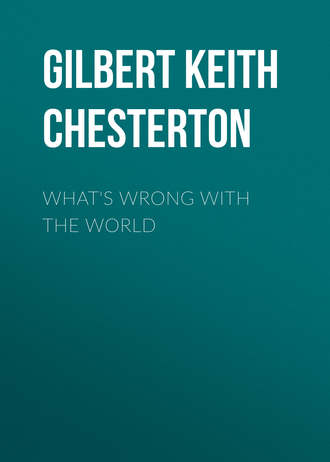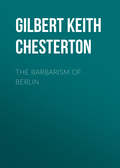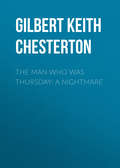
Гилберт Кит Честертон
What's Wrong with the World
IX. HISTORY OF HUDGE AND GUDGE
There is, let us say, a certain filthy rookery in Hoxton, dripping with disease and honeycombed with crime and promiscuity. There are, let us say, two noble and courageous young men, of pure intentions and (if you prefer it) noble birth; let us call them Hudge and Gudge. Hudge, let us say, is of a bustling sort; he points out that the people must at all costs be got out of this den; he subscribes and collects money, but he finds (despite the large financial interests of the Hudges) that the thing will have to be done on the cheap if it is to be done on the spot. He therefore, runs up a row of tall bare tenements like beehives; and soon has all the poor people bundled into their little brick cells, which are certainly better than their old quarters, in so far as they are weather proof, well ventilated and supplied with clean water. But Gudge has a more delicate nature. He feels a nameless something lacking in the little brick boxes; he raises numberless objections; he even assails the celebrated Hudge Report, with the Gudge Minority Report; and by the end of a year or so has come to telling Hudge heatedly that the people were much happier where they were before. As the people preserve in both places precisely the same air of dazed amiability, it is very difficult to find out which is right. But at least one might safely say that no people ever liked stench or starvation as such, but only some peculiar pleasures en tangled with them. Not so feels the sensitive Gudge. Long before the final quarrel (Hudge v. Gudge and Another), Gudge has succeeded in persuading himself that slums and stinks are really very nice things; that the habit of sleeping fourteen in a room is what has made our England great; and that the smell of open drains is absolutely essential to the rearing of a viking breed.
But, meanwhile, has there been no degeneration in Hudge? Alas, I fear there has. Those maniacally ugly buildings which he originally put up as unpretentious sheds barely to shelter human life, grow every day more and more lovely to his deluded eye. Things he would never have dreamed of defending, except as crude necessities, things like common kitchens or infamous asbestos stoves, begin to shine quite sacredly before him, merely because they reflect the wrath of Gudge. He maintains, with the aid of eager little books by Socialists, that man is really happier in a hive than in a house. The practical difficulty of keeping total strangers out of your bedroom he describes as Brotherhood; and the necessity for climbing twenty-three flights of cold stone stairs, I dare say he calls Effort. The net result of their philanthropic adventure is this: that one has come to defending indefensible slums and still more indefensible slum-landlords, while the other has come to treating as divine the sheds and pipes which he only meant as desperate. Gudge is now a corrupt and apoplectic old Tory in the Carlton Club; if you mention poverty to him he roars at you in a thick, hoarse voice something that is conjectured to be “Do ‘em good!” Nor is Hudge more happy; for he is a lean vegetarian with a gray, pointed beard and an unnaturally easy smile, who goes about telling everybody that at last we shall all sleep in one universal bedroom; and he lives in a Garden City, like one forgotten of God.
Such is the lamentable history of Hudge and Gudge; which I merely introduce as a type of an endless and exasperating misunderstanding which is always occurring in modern England. To get men out of a rookery men are put into a tenement; and at the beginning the healthy human soul loathes them both. A man’s first desire is to get away as far as possible from the rookery, even should his mad course lead him to a model dwelling. The second desire is, naturally, to get away from the model dwelling, even if it should lead a man back to the rookery. But I am neither a Hudgian nor a Gudgian; and I think the mistakes of these two famous and fascinating persons arose from one simple fact. They arose from the fact that neither Hudge nor Gudge had ever thought for an instant what sort of house a man might probably like for himself. In short, they did not begin with the ideal; and, therefore, were not practical politicians.
We may now return to the purpose of our awkward parenthesis about the praise of the future and the failures of the past. A house of his own being the obvious ideal for every man, we may now ask (taking this need as typical of all such needs) why he hasn’t got it; and whether it is in any philosophical sense his own fault. Now, I think that in some philosophical sense it is his own fault, I think in a yet more philosophical sense it is the fault of his philosophy. And this is what I have now to attempt to explain.
Burke, a fine rhetorician, who rarely faced realities, said, I think, that an Englishman’s house is his castle. This is honestly entertaining; for as it happens the Englishman is almost the only man in Europe whose house is not his castle. Nearly everywhere else exists the assumption of peasant proprietorship; that a poor man may be a landlord, though he is only lord of his own land. Making the landlord and the tenant the same person has certain trivial advantages, as that the tenant pays no rent, while the landlord does a little work. But I am not concerned with the defense of small proprietorship, but merely with the fact that it exists almost everywhere except in England. It is also true, however, that this estate of small possession is attacked everywhere today; it has never existed among ourselves, and it may be destroyed among our neighbors. We have, therefore, to ask ourselves what it is in human affairs generally, and in this domestic ideal in particular, that has really ruined the natural human creation, especially in this country.
Man has always lost his way. He has been a tramp ever since Eden; but he always knew, or thought he knew, what he was looking for. Every man has a house somewhere in the elaborate cosmos; his house waits for him waist deep in slow Norfolk rivers or sunning itself upon Sussex downs. Man has always been looking for that home which is the subject matter of this book. But in the bleak and blinding hail of skepticism to which he has been now so long subjected, he has begun for the first time to be chilled, not merely in his hopes, but in his desires. For the first time in history he begins really to doubt the object of his wanderings on the earth. He has always lost his way; but now he has lost his address.
Under the pressure of certain upper-class philosophies (or in other words, under the pressure of Hudge and Gudge) the average man has really become bewildered about the goal of his efforts; and his efforts, therefore, grow feebler and feebler. His simple notion of having a home of his own is derided as bourgeois, as sentimental, or as despicably Christian. Under various verbal forms he is recommended to go on to the streets – which is called Individualism; or to the work-house – which is called Collectivism. We shall consider this process somewhat more carefully in a moment. But it may be said here that Hudge and Gudge, or the governing class generally, will never fail for lack of some modern phrase to cover their ancient predominance. The great lords will refuse the English peasant his three acres and a cow on advanced grounds, if they cannot refuse it longer on reactionary grounds. They will deny him the three acres on grounds of State Ownership. They will forbid him the cow on grounds of humanitarianism.
And this brings us to the ultimate analysis of this singular influence that has prevented doctrinal demands by the English people. There are, I believe, some who still deny that England is governed by an oligarchy. It is quite enough for me to know that a man might have gone to sleep some thirty years ago over the day’s newspaper and woke up last week over the later newspaper, and fancied he was reading about the same people. In one paper he would have found a Lord Robert Cecil, a Mr. Gladstone, a Mr. Lyttleton, a Churchill, a Chamberlain, a Trevelyan, an Acland. In the other paper he would find a Lord Robert Cecil, a Mr. Gladstone, a Mr. Lyttleton, a Churchill, a Chamberlain, a Trevelyan, an Acland. If this is not being governed by families I cannot imagine what it is. I suppose it is being governed by extraordinary democratic coincidences.
X. OPPRESSION BY OPTIMISM
But we are not here concerned with the nature and existence of the aristocracy, but with the origin of its peculiar power, why is it the last of the true oligarchies of Europe; and why does there seem no very immediate prospect of our seeing the end of it? The explanation is simple though it remains strangely unnoticed. The friends of aristocracy often praise it for preserving ancient and gracious traditions. The enemies of aristocracy often blame it for clinging to cruel or antiquated customs. Both its enemies and its friends are wrong. Generally speaking the aristocracy does not preserve either good or bad traditions; it does not preserve anything except game. Who would dream of looking among aristocrats anywhere for an old custom? One might as well look for an old costume! The god of the aristocrats is not tradition, but fashion, which is the opposite of tradition. If you wanted to find an old-world Norwegian head-dress, would you look for it in the Scandinavian Smart Set? No; the aristocrats never have customs; at the best they have habits, like the animals. Only the mob has customs.
The real power of the English aristocrats has lain in exactly the opposite of tradition. The simple key to the power of our upper classes is this: that they have always kept carefully on the side of what is called Progress. They have always been up to date, and this comes quite easy to an aristocracy. For the aristocracy are the supreme instances of that frame of mind of which we spoke just now. Novelty is to them a luxury verging on a necessity. They, above all, are so bored with the past and with the present, that they gape, with a horrible hunger, for the future.
But whatever else the great lords forgot they never forgot that it was their business to stand for the new things, for whatever was being most talked about among university dons or fussy financiers. Thus they were on the side of the Reformation against the Church, of the Whigs against the Stuarts, of the Baconian science against the old philosophy, of the manufacturing system against the operatives, and (to-day) of the increased power of the State against the old-fashioned individualists. In short, the rich are always modern; it is their business. But the immediate effect of this fact upon the question we are studying is somewhat singular.
In each of the separate holes or quandaries in which the ordinary Englishman has been placed, he has been told that his situation is, for some particular reason, all for the best. He woke up one fine morning and discovered that the public things, which for eight hundred years he had used at once as inns and sanctuaries, had all been suddenly and savagely abolished, to increase the private wealth of about six or seven men. One would think he might have been annoyed at that; in many places he was, and was put down by the soldiery. But it was not merely the army that kept him quiet. He was kept quiet by the sages as well as the soldiers; the six or seven men who took away the inns of the poor told him that they were not doing it for themselves, but for the religion of the future, the great dawn of Protestantism and truth. So whenever a seventeenth century noble was caught pulling down a peasant’s fence and stealing his field, the noble pointed excitedly at the face of Charles I or James II (which at that moment, perhaps, wore a cross expression) and thus diverted the simple peasant’s attention. The great Puritan lords created the Commonwealth, and destroyed the common land. They saved their poorer countrymen from the disgrace of paying Ship Money, by taking from them the plow money and spade money which they were doubtless too weak to guard. A fine old English rhyme has immortalized this easy aristocratic habit —
You prosecute the man or woman Who steals the goose from off the common, But leave the larger felon loose Who steals the common from the goose.
But here, as in the case of the monasteries, we confront the strange problem of submission. If they stole the common from the goose, one can only say that he was a great goose to stand it. The truth is that they reasoned with the goose; they explained to him that all this was needed to get the Stuart fox over seas. So in the nineteenth century the great nobles who became mine-owners and railway directors earnestly assured everybody that they did not do this from preference, but owing to a newly discovered Economic Law. So the prosperous politicians of our own generation introduce bills to prevent poor mothers from going about with their own babies; or they calmly forbid their tenants to drink beer in public inns. But this insolence is not (as you would suppose) howled at by everybody as outrageous feudalism. It is gently rebuked as Socialism. For an aristocracy is always progressive; it is a form of going the pace. Their parties grow later and later at night; for they are trying to live to-morrow.
XI. THE HOMELESSNESS OF JONES
Thus the Future of which we spoke at the beginning has (in England at least) always been the ally of tyranny. The ordinary Englishman has been duped out of his old possessions, such as they were, and always in the name of progress. The destroyers of the abbeys took away his bread and gave him a stone, assuring him that it was a precious stone, the white pebble of the Lord’s elect. They took away his maypole and his original rural life and promised him instead the Golden Age of Peace and Commerce inaugurated at the Crystal Palace. And now they are taking away the little that remains of his dignity as a householder and the head of a family, promising him instead Utopias which are called (appropriately enough) “Anticipations” or “News from Nowhere.” We come back, in fact, to the main feature which has already been mentioned. The past is communal: the future must be individualist. In the past are all the evils of democracy, variety and violence and doubt, but the future is pure despotism, for the future is pure caprice. Yesterday, I know I was a human fool, but to-morrow I can easily be the Superman.
The modern Englishman, however, is like a man who should be perpetually kept out, for one reason after another, from the house in which he had meant his married life to begin. This man (Jones let us call him) has always desired the divinely ordinary things; he has married for love, he has chosen or built a small house that fits like a coat; he is ready to be a great grandfather and a local god. And just as he is moving in, something goes wrong. Some tyranny, personal or political, suddenly debars him from the home; and he has to take his meals in the front garden. A passing philosopher (who is also, by a mere coincidence, the man who turned him out) pauses, and leaning elegantly on the railings, explains to him that he is now living that bold life upon the bounty of nature which will be the life of the sublime future. He finds life in the front garden more bold than bountiful, and has to move into mean lodgings in the next spring. The philosopher (who turned him out), happening to call at these lodgings, with the probable intention of raising the rent, stops to explain to him that he is now in the real life of mercantile endeavor; the economic struggle between him and the landlady is the only thing out of which, in the sublime future, the wealth of nations can come. He is defeated in the economic struggle, and goes to the workhouse. The philosopher who turned him out (happening at that very moment to be inspecting the workhouse) assures him that he is now at last in that golden republic which is the goal of mankind; he is in an equal, scientific, Socialistic commonwealth, owned by the State and ruled by public officers; in fact, the commonwealth of the sublime future.
Nevertheless, there are signs that the irrational Jones still dreams at night of this old idea of having an ordinary home. He asked for so little, and he has been offered so much. He has been offered bribes of worlds and systems; he has been offered Eden and Utopia and the New Jerusalem, and he only wanted a house; and that has been refused him.
Such an apologue is literally no exaggeration of the facts of English history. The rich did literally turn the poor out of the old guest house on to the road, briefly telling them that it was the road of progress. They did literally force them into factories and the modern wage-slavery, assuring them all the time that this was the only way to wealth and civilization. Just as they had dragged the rustic from the convent food and ale by saying that the streets of heaven were paved with gold, so now they dragged him from the village food and ale by telling him that the streets of London were paved with gold. As he entered the gloomy porch of Puritanism, so he entered the gloomy porch of Industrialism, being told that each of them was the gate of the future. Hitherto he has only gone from prison to prison, nay, into darkening prisons, for Calvinism opened one small window upon heaven. And now he is asked, in the same educated and authoritative tones, to enter another dark porch, at which he has to surrender, into unseen hands, his children, his small possessions and all the habits of his fathers.
Whether this last opening be in truth any more inviting than the old openings of Puritanism and Industrialism can be discussed later. But there can be little doubt, I think, that if some form of Collectivism is imposed upon England it will be imposed, as everything else has been, by an instructed political class upon a people partly apathetic and partly hypnotized. The aristocracy will be as ready to “administer” Collectivism as they were to administer Puritanism or Manchesterism; in some ways such a centralized political power is necessarily attractive to them. It will not be so hard as some innocent Socialists seem to suppose to induce the Honorable Tomnoddy to take over the milk supply as well as the stamp supply – at an increased salary. Mr. Bernard Shaw has remarked that rich men are better than poor men on parish councils because they are free from “financial timidity.” Now, the English ruling class is quite free from financial timidity. The Duke of Sussex will be quite ready to be Administrator of Sussex at the same screw. Sir William Harcourt, that typical aristocrat, put it quite correctly. “We” (that is, the aristocracy) “are all Socialists now.”
But this is not the essential note on which I desire to end. My main contention is that, whether necessary or not, both Industrialism and Collectivism have been accepted as necessities – not as naked ideals or desires. Nobody liked the Manchester School; it was endured as the only way of producing wealth. Nobody likes the Marxian school; it is endured as the only way of preventing poverty. Nobody’s real heart is in the idea of preventing a free man from owning his own farm, or an old woman from cultivating her own garden, any more than anybody’s real heart was in the heartless battle of the machines. The purpose of this chapter is sufficiently served in indicating that this proposal also is a pis aller, a desperate second best – like teetotalism. I do not propose to prove here that Socialism is a poison; it is enough if I maintain that it is a medicine and not a wine.
The idea of private property universal but private, the idea of families free but still families, of domesticity democratic but still domestic, of one man one house – this remains the real vision and magnet of mankind. The world may accept something more official and general, less human and intimate. But the world will be like a broken-hearted woman who makes a humdrum marriage because she may not make a happy one; Socialism may be the world’s deliverance, but it is not the world’s desire.







